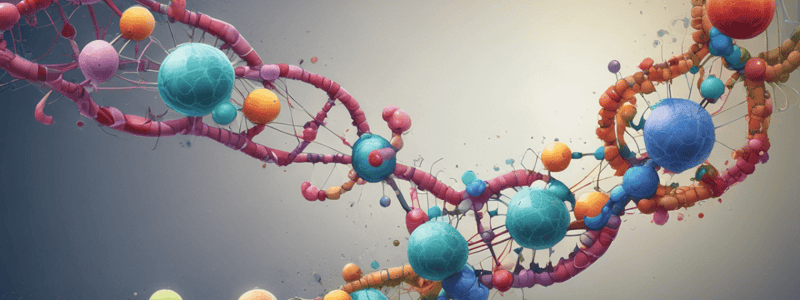Podcast
Questions and Answers
What is the main disadvantage of regulating gene expression at the transcriptional level?
What is the main disadvantage of regulating gene expression at the transcriptional level?
- Variable gene expression levels
- Lack of specificity
- Long-term consequences (correct)
- High energy consumption
What is the primary reason why amino acids are measured in triplets?
What is the primary reason why amino acids are measured in triplets?
- Because each triplet corresponds to a unique protein
- Because each amino acid needs 3 nucleotides to be synthesized (correct)
- Because triplets are the most common form of amino acid sequence
- Because triplets are the most stable form of amino acid structure
Why is the translation of proteins more important than the transcription of RNA during cell stress?
Why is the translation of proteins more important than the transcription of RNA during cell stress?
- Because transcription is more prone to errors during cell stress
- Because the final product of translation is more critical than the intermediate product of transcription (correct)
- Because translation is more energy-efficient than transcription
- Because proteins are more important for cell survival
What is the main difference between the RNA pool and the protein pool?
What is the main difference between the RNA pool and the protein pool?
What is the approximate percentage of regulation that occurs at the transcriptional level?
What is the approximate percentage of regulation that occurs at the transcriptional level?
What is the main reason for regulating protein synthesis before translation?
What is the main reason for regulating protein synthesis before translation?
What is the ratio of mRNA transcription to total transcription in S. cerevisiae?
What is the ratio of mRNA transcription to total transcription in S. cerevisiae?
Why is it more efficient to regulate protein synthesis at the transcriptional level?
Why is it more efficient to regulate protein synthesis at the transcriptional level?
What is the approximate cost of transcribing an mRNA molecule?
What is the approximate cost of transcribing an mRNA molecule?
What is the primary factor that determines the relative importance of transcriptional and translational regulation?
What is the primary factor that determines the relative importance of transcriptional and translational regulation?
What is the primary consequence of decreasing the rate of protein degradation?
What is the primary consequence of decreasing the rate of protein degradation?
What is the main function of RNA Pol I and III?
What is the main function of RNA Pol I and III?
What is the advantage of having multiple levels of regulation?
What is the advantage of having multiple levels of regulation?
What is the purpose of having a 'noise' in biological systems?
What is the purpose of having a 'noise' in biological systems?
What is the main difference between the two regulation stages mentioned in the text?
What is the main difference between the two regulation stages mentioned in the text?
What is the relationship between the rate of protein synthesis and degradation?
What is the relationship between the rate of protein synthesis and degradation?
Why does the regulation of gene expression occur at multiple levels?
Why does the regulation of gene expression occur at multiple levels?
What is the primary advantage of having multiple levels of gene regulation?
What is the primary advantage of having multiple levels of gene regulation?
What would happen if there was only one level of gene regulation?
What would happen if there was only one level of gene regulation?
What is the result of having multiple levels of gene regulation?
What is the result of having multiple levels of gene regulation?
Why is it beneficial to have multiple stages of gene regulation?
Why is it beneficial to have multiple stages of gene regulation?
What drives the evolution of multiple levels of gene regulation?
What drives the evolution of multiple levels of gene regulation?
Flashcards are hidden until you start studying
Study Notes
Regulation of Gene Expression
- The information is stored in DNA, but it's expressed as proteins, with intermediate steps like transcription, translation, and degradation of DNA molecules.
Reasons for Multiple Levels of Regulation
- The multiple levels of regulation exist due to evolution, which acts on each stage, making the system more robust and allowing for fine-tuning.
- Having multiple levels of regulation allows for redundancy, so if one level fails, the others can take over, ensuring the expression of the gene.
- Each level of regulation can have different advantages and disadvantages, making the system more flexible.
Regulation at Different Stages
- Regulation at the initiation of the process is more economical, as it prevents the gene from being expressed, but it can have long-term consequences.
- Regulation at the protein level is more expensive, as it involves destroying the protein after it's synthesized, but it's a more precise mechanism.
- The gradability of regulation is improved with multiple stages.
Model of the Pools for mRNA and Protein
- Most RNAs don't have a function by themselves but carry the message from the nucleus to the cytoplasm for protein synthesis.
- The regulation of protein synthesis is more important than mRNA synthesis.
- The pools of mRNA and protein are interdependent, with the protein pool depending on the mRNA pool.
- The rate of synthesis and degradation of protein affects the energy required to maintain stable protein levels.
Relative Cost of Transcription and Translation
- Transcription is not more expensive than translation; the cost is relative to the number of RNA and protein molecules per cell.
- In a cell, 75% of transcription is dedicated to building the translation machinery, leaving only 25% for making messages.
- The cost of transcribing an RNA molecule is approximately 6.6 ATP per nucleotide introduced.
- The cost of translation is much higher, around 150 times more expensive than transcription.
Importance of Regulation Levels
- 85% of regulation occurs at the transcription level, while 15% occurs at the translation level.
- The main function of transcription is to regulate protein synthesis, which is the primary cellular activity.
- It's easier to regulate transcription because mRNA is more unstable, making it easier to change its quantity.
- The regulation of transcription is more important than translation in terms of cellular functionality.
Studying That Suits You
Use AI to generate personalized quizzes and flashcards to suit your learning preferences.




